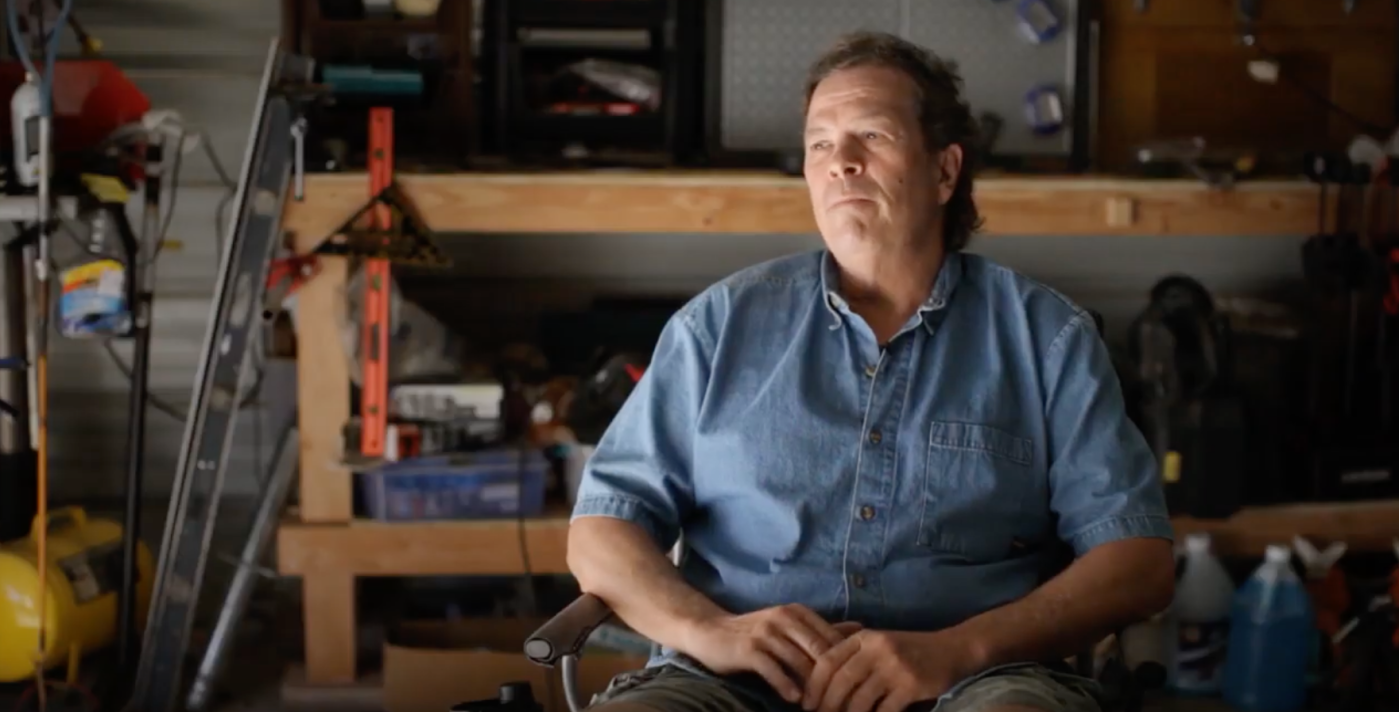This past Veterans Day weekend, Verizon highlighted its partnership with VA in a commercial featuring VA’s telehealth services.
In the commercial, Navy Veteran Jim Doray uses VA Video Connect, an app that enables Veterans to conduct secure and confidential video appointments with their health care provider.
As part of its VA partnership, Verizon offers Veterans access to VA Video Connect on its 4G LTE network. Veterans can access this service free of charge.
“[VA Video Connect] is one of the best tools in my toolbox for health care,” said Jim.
Jim and his wife, Paulina, live in Julian, California — more than 50 miles from the nearest VA medical center. Jim suffered a spinal cord injury in 2013. His recovery required frequent all-day trips to medical appointments, putting significant strain on the Dorays.
In 2015, Jim’s doctor suggested that he use VA Video Connect and other telehealth tools. Skeptical at first, he said the switch transformed his life.
“Telehealth allows me to live out in a rural environment without having to make the journey for routine care,” he said. “I am so glad that I made the change.”
Increased use
In fiscal 2019, VA Video Connect use increased 235%. Over 99,000 Veterans used the app in their homes rather than visiting a VA facility.
In addition to VA Video Connect, VA offers a suite of telehealth technologies that change the way Veterans receive treatment. These tools enable Veterans to communicate with their health care teams, order prescriptions, and access their health information.
“VA is committed to offering Veterans the health care they deserve, whenever and wherever they need,” said VA Secretary Robert Wilkie. “We want every Veteran to have a choice to schedule an in-person, telephone, or video visit with their providers, depending on their preferences for health care delivery.”
Mike Maiorana, senior vice president of Verizon’s public sector services, said, “Regardless of whether they live in city centers or rural areas, Veterans should be able to access the VA’s telehealth resources.”
The Verizon commercial aired on CNBC, NBC Sports, and the American Forces Network Nov. 10 and 11.
Visit the VA Telehealth Services website to learn how VA is improving Veterans’ care through telehealth.
Topics in this story
More Stories
The Medical Foster Home program offers Veterans an alternative to nursing homes.
Watch the Under Secretary for Health and a panel of experts discuss VA Health Connect tele-emergency care.
The 2024 National Veteran Suicide Prevention Annual Report provides the foundation for VA’s suicide prevention programs and initiatives.







Very good idea
The bad part of this is that it is a facade on Verizons behalf because Verizon consists of liars and crooks. They said they’d help me straighten out problems with my Verizon account, but it was a lie. I no longer use, condone, recomend or trust Verzon. After their “help”, I owed them more than before I asked them for help. They are not helping disabled veterans, they prey on veterans and are liars and crooks.
Thanks you to Verizon for this great opportunity to be able to visit doctors without using our data allowance.
Great paragraph, thanks a lot.
“We want every Veteran to have a choice to schedule an in-person, telephone, or video visit with their providers, depending on their preferences for health care delivery.”
This past Veterans Day weekend, Verizon highlighted its partnership with VA in a commercial featuring VA’s telehealth services.
In the commercial, Navy Veteran Jim Doray uses VA Video Connect, an app that enables Veterans to conduct secure and confidential video appointments with their health care provider.
As part of its VA partnership, Verizon offers Veterans access to VA Video Connect on its 4G LTE network. Veterans can access this service free of charge.
“[VA Video Connect] is one of the best tools in my toolbox for health care,” said Jim.
Jim and his wife, Paulina, live in Julian, California — more than 50 miles from the nearest VA medical center. Jim suffered a spinal cord injury in 2013. His recovery required frequent all-day trips to medical appointments, putting significant strain on the Dorays.
In 2015, Jim’s doctor suggested that he use VA Video Connect and other telehealth tools. Skeptical at first, he said the switch transformed his life.
“Telehealth allows me to live out in a rural environment without having to make the journey for routine care,” he said. “I am so glad that I made the change.”